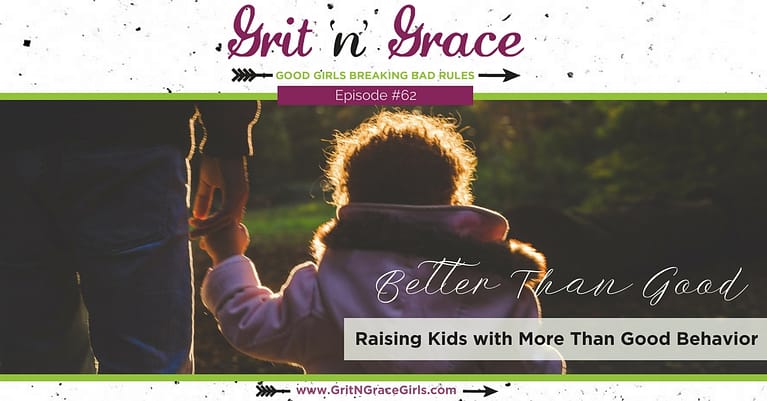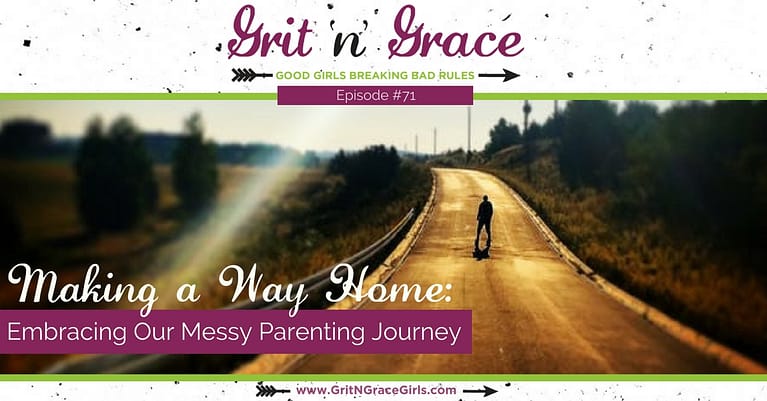
The complaining of the people around us seems relentless. Sometimes even our own grousing seems overwhelming. If you committed to a grumble-free life, how long would you make it? A day? A week? Longer? (Or maybe not through the next hour!) Author Tricia Goyer, along with her family, committed to a grumble free year. Listen in for the lessons they learned and the strategies they adopted for less complaining and more praise. This episode is a life-changer!
(This page contains affiliate links. Your clicks and purchases help support Grit 'n' Grace at no extra charge to you.)
Recommended Resources
- Tricia’s Book: The Grumble Free Year
- Tricia’s Blog Post: “No More Grumbles: How I learned to Trust God, Stop Acting Helpless, and Be a Better Example to My Kids“
- Tricia’s Blog Post: “How to Go From Grumbly to Grateful“
- Tricia’s Blog Post: “How to Find Peace in Chaos“
Downloads
Your Turn
- What circumstances in life make you prone to complaining?
- What place of praise can you find in that circumstance?
- How might your attitude about that change if you convert grumbling to praise?
Today’s Guest — Tricia Goyer

Transcript — scroll to read here (or download above)
****
Grit ‘n’ Grace: Good Girls Breaking Bad Rules
Episode #173: How to Achieve the Impossible Goal of Being Grumble-Free
Amy: One of our listeners recently wrote and said, “My biggest struggle with people pleasing is not taking it personally when parents are critical with me or my family members. When someone tells me I’m not teaching a subject right because their student didn’t get the grade they wanted it’s hard. Or there’s constant girl drama on the playground. Recess is supposed to be fun, right? Or when a parent complains to my husband about the coach or officials because their team lost. It brings me down. I want everyone to be happy but that isn’t possible.”
I just laughed when I heard that ‘cause I think we have all felt that way that we do not like complaints coming in our direction. But I have to say that it was sort of an ouch, too, because my problem is too often I’m the complainer in the situation. You, Cheri?
Cheri: Me? Me, oh, I never complain.
Amy: Ohh. I’m so glad.
Cheri: But I’ll tell you what bothers me. Oh no, pfft, I can’t even go there.
[Laughter]
Not only am I often a complainer. I have this habit of hiding or dressing up my complaining so that it’s not easily recognizable. It was my students, about ten years ago, that pointed out that one of my techniques is sarcasm. Because I’ll say something, I’ll see a piece of trash sitting on the floor right next to the trashcan, and I’ll be, like, “It would shore be nice if this piece of trash could make it up from the floor into the trashcan.” And they would be, like, rolling their eyes at Mrs. G.
Or I’ll come home after shopping, and I’ll use storytelling, like storytelling lead-in with my family. I’ll be like you would not believe what the cashier at Wal-Mart… And it sounds like I’m going to tell this amazing, and no, I’m just going to complain because she did not know how to enter something in multiples and entered 20 items one by one instead of doing times twenty or whatever.
And then the other thing I’ll do is I’ll act as if I can do a dismissive comment and laughter at the end will magically make it not a complaint. Whine, whine, whine, whine, whine but it doesn’t actually matter. Ha, ha, ha, ha.
And it turns out all of those are still complaining. So. Do you happen to mask any of your complaining, Amy?
[Laughter|
Amy: Well, I have started thinking I think there might have been a lot of times when I’ve shared a complaint as a prayer request.
[Giggling]
Cheri: That’s the Christian way.
Amy: That’s right. In my women’s class, you know, it’s like whatever is the current thing I want to grouse about. That’s what I share.
Cheri: Okay, wait, so you’ve got to be really honest here. Do you ever start to phrase it as a complaint, and then go, wait, how can I phrase this as a prayer request?
Amy: Oh, yes. While I’m waiting for everybody to talk I’m already doing this in my head, yes. And, okay, I have to share one other funny one. I grew up in a house with a door slammer. So there were no words at all, but my mother, she’s petite but fierce, man. She was the door slammer so you always knew she was perturbed if the door slammed. It’s so disappointing. In our current home, we have hollow framed doors…
[Laughter]
And so, I’ll try to slam it, and it just kind of whiff. That’s it. So unsatisfying!
[Laughter]
Cheri: Yeah. Thunk. It just doesn’t work. It doesn’t sound enough like a complaint.
Amy: Exactly.
Cheri: Well, this is Cheri Gregory.
Amy: And I’m Amy Carroll.
Cheri: And you’re listening to Grit ‘N’ Grace: Good Girls Breaking Bad Rules. The podcast that equips you to lose who you’re not, love who you are, and live your one life well.
Amy: Today we’re talking to Tricia Goyer. Tricia is a busy mom of ten, doting grandma, and wife to John. She is the founder of Hope Pregnancy Ministries and currently leads a Team MOPs group in Little Rock, Arkansas…
Well, Trisha, your new book, A Grumble-Free Year, I just love the subtitle for it: Twelve Months, Eleven Family Members, and One Impossible Goal. Why did you take the challenge of a grumble-free year?
Trisha: Well, first of all, it’s that second part, there’s eleven family members living in our house.
[Laughter]
Amy: That’s the miracle right there.
Trisha: And so there’s always grumbling, there’s always someone complaining about something, but we really decided – like, John and I had talked about it for a while, doing it – we really decided when we were on a – well, we were 25 miles into a 5,000 mile road trip with our kids. And you know, they would grumble about where we stopped, when we stopped, how long we stopped, who was touching them, who was breathing on them in the car, so we said, “This is enough. We need to do something about this.”
Cheri: Ok. I’m just gonna let that all sink in for our listeners here. Sounds like a wonderful catalyst. So you talk in your book about how you grew up learning how to be good to avoid conflict and not yell. And so the perfectionist part of me is nodding and thinking, “Good, good, good!” So how on earth did you end up becoming a grumbler when you learned so many good things growing up?
Trisha: My family, like, we weren’t the ones that were yelling at each other and that were loud. I was the oldest child, oldest grandchild, I was the one that was always good, never got into trouble. My little brother always got into trouble. But what I have learned was the grumbles. So I would hear it from my mom or my grandma. They’d say things like, “Oh, it must be nice to be able to go on vacation like the neighbors.” Or, “Oh, I wish someone would help me in the kitchen.” So it’s never like they would ask for help, it was just the grumbling. And then, you kind of knew that they wanted help, so I would go in and help them, but no one ever communicated. They just kinda grumbled about what wasn’t going right. And so really, I learned that – I would never explode or yell or “I need help!” or all those things, but it was more that grumbling that just kind of built and built and built.
Cheri: So it was almost like it was code, like, you had to learn this coded communication.
Amy: If you say it – I had a person like this in my family, too – if you say it in a really nice tone of voice, it’s not really grumbling, right?
Trisha: Kind of like I thought, “I don’t have a big problem with this, it’s just kinda letting everyone know.” The problem came when people – you know, after I got married, my husband didn’t pick up on it. He had to learn the code!
[Laughter]
Amy: Well, in the book, you say that there were problems and issues that needed to be worked through. “But instead of talking to others about them, I held them all inside, not wanting to complain.” Well, the people-pleaser part of me is nodding and thinking, “Well you’ve got that right!” But how is talking about problems and working through issues different from grumbling and complaining?
Trisha: Yeah, and I think it goes back to that communication part. Where I didn’t know how to talk to my husband, or later when we had kids, our kids, about what I needed, what I wanted from them. About, “Hey guys, we’re going to do this later. Let’s all pick up the house.” I would just grumble and complain, grumble and complain. And so really, I think all of us are gonna have things that go wrong. Things that we need help with, things that we struggle with, and when we’re able to talk to someone about it, to communicate our needs, to thank them for helping us. It’s good healthy communication instead of grumbling and complaining and expecting, first of all, that people will understand what we need and, second of all, often they’re doing it just because they’re tired of hearing me grumble, or they don’t want me to – you know, that grumbling to grow where it’ll explode into anger, which that happens too. And so they would comply, not because they wanted to help me, but because they’re tired of hearing me grumble about something.
Cheri: Whew. Ok, so… ok. What I’m about to talk about steps on my toes, but that stepped on my toes, too. So thank you, in advance. So this part really stepped on my toes. You said, “I wasn’t angry, at least I didn’t think I was, but the grumbling confirmed the story in my head. I do everything for everybody and nobody does anything for me.” So, talk to us about the connection between grumbling and anger. Because I bet quite a few of our listeners are like me and they wouldn’t have necessarily drawn a straight line between grumbling and anger.
Trisha: Right. Well grumbling, when we start grumbling, basically we disconnect. We might have unrealistic expectations, we want our kids to do something, they’re not doing it, we may be overwhelmed, and so those grumbles will be there and for me, I homeschool six kids and so by Friday, when I wake up, the house is a mess. You know, we have homeschool books piling all week long, there are shoes everywhere, and so I’ve been grumbling all week. But usually, by Friday, I’m like, “We need to clean up! This is ridiculous!” And I can only deal with it for so long. And so, just because I didn’t proactively communicate during the week and work with the kids to get stuff picked up, the grumbling didn’t work and all of a sudden I’m exploding, I’m angry. And then I’m apologizing, “I shouldn’t have yelled at you,” so it just made this bad cycle that I was realizing I was giving in to.
Amy: Well, I wanna circle back. And this is – all of this is tied together, of course – but you talked about how you expected people to meet your needs even when you haven’t – hadn’t told them what they were. And I think that leads to this exploding that you’re talking about. But can you unpack it for us? Like, bit by bit. So how – what are some positive ways to express our needs without coming across as selfish or sounding like we’re complaining?
Trisha: Yeah, that is so good. So, ways to express our needs: one thing I had to talk to my husband about just a couple weeks ago is we have teenagers who like to stay up late, and of course, when the little kids are in bed that’s when they want to talk, that’s when they want to watch a show with us, and so John and I would stay up until 11, 11:30 with the teenagers and then I’m getting up to have my quiet time, to have my devotions, so I was exhausted. So I just said, I explained, “I love the time with the teenagers, maybe if we push back – push up – the little kids’ bedtime so we have time with them – but if we can get in bed by 10 or 10:30, that would just really help me.” And so I shared a need, “I’m really getting tired. I can see it’s wearing me down during the week,” – and my husband, he’ll just go along with the conversation, he’ll ask the meaningful, “What did it mean in Exodus when bla bla bla…” and then all of a sudden they’re in this deep conversation, so I don’t want to cut that off completely, but I just wanted to let him know, “I need more sleep here.” And so it was just me saying, “This is my need.” This is the communication. And so there’d be times I could see him kind of looking at his clock and say, “Okay, this is going to be the last question, we’re gonna all go to bed.” And it wasn’t something I made a big deal about and was complaining and grumbling about to the kids, it was just something I talked to him about. So that’s just really a big difference between grumbling about something, grumbling about a problem, and then able to communicate it with someone and come up with a solution.
Amy: That’s so helpful, because it’s so low-level. You know, we think, “Well, surely that’s too easy. It couldn’t fix it.” But it did fix that problem!
Trisha: Yeah, it did.
Cheri: Well, and you know one of the important things I’m hearing is you talked about it at a time that it wasn’t – you didn’t talk to him about it at midnight, I’m assuming.
Trisha: Right.
Cheri: You talked to him about it at a time that the problem wasn’t occurring, but at a time that you guys could talk about it, he could think about it, and then execute the solution the next time, or you know, soon thereafter. So that makes a lot of sense.
Well, one of the best ways to stop a bad habit is to replace it with a good habit. And so what did your family start doing instead of grumbling?
Trisha: Well, I think the first thing of course is I had to model it. So I had to point out things that I was grateful for and then really praise when I saw my kids doing something. So when they would say thank you or when they would ask for help instead of grumbling, or when I asked them to do something like maybe they were reading something and I said, “Ok, it’s time to do your chores!” instead of them exploding and saying, “What! I don’t want to do that!” if they answered and said, “Can I finish this page?” or “Can I finish this chapter? I was like, “Great job!” And so, it was really, first of all, after I modeled it, noting when they didn’t grumble about something because grumbling was pretty much every time I told them to do something was grumbling.
When they started to make changes, when they were aware of their communication, and how they responded to me, when they didn’t give me the eye roll when I talked to them, then I’d say, “Great job! You didn’t roll your eyes!” and at first they’re looking at me like, “Ok…” but then you could see that they wanted to work on it. I’d also say, “You were really mature in your response.” And, of course, they were like, “Wow, I’m mature.” And they’d want to do it more.
So we started doing that.
And then also, we have a gratitude jar where we – when we’re feeling grateful, we just write those gratitude’s down. We have little slips of paper right there in our dining room next to our jar, something they’re thankful for, they’ll go over and write it, sometimes we’ll pass it around at dinner or at other times. So it’s just making note of having gratitude instead of always just pointing out the grumbling. You know, at first, it’s just like everyone – everyone at the time, and that’s not helping because they’re grumbling about each other’s grumbling! But when we took time to like, “Ok. We are being grateful.” and took note of that. That made a huge difference.
Cheri: Mmm.
Amy: I love that you shared with us about how you got your kids to buy in because that was one of my big questions.
Trisha: Yes.
Amy: Well, tell us one of your favorite stories from Your Grumble-Free Year.
Trisha: Ok, this is probably the hardest story, but it ended up being our favorite story. So, my grandma is involved in this too. So we have our kids at home, my husband and I, my grandma was in her late 80s when we were going through this year, she just turned 90 now. And she is a little spitfire. But around Thanksgiving, she fell and broke her back. And so, she had a broken back, and she also has dementia, so she did not remember she had a broken back. And so, we had to actually put an alarm by her bed so when she would try to get up we’d have to run in there and say, “Don’t move! We have to put your back brace on. Your back is broken.” because she did not remember. So she couldn’t remember her back was broken, she didn’t know why this alarm was going off, or what was going on, she couldn’t remember so many things. But after she realized, “Ok, my back’s broken.” she would just lay there and praise God. So she couldn’t even use the potty by her bed because she couldn’t get out of bed, but she would sing praises to God. She would sing these hymns – every line of every hymn, she remembers them and would sing. She’d pray for all her family members, and our homeschool room is right next to Grandma’s room. And I would say, “Listen to that.” And they would say, “Yeah.” And we talked about like grumbling, like; it’s so easy to grumble about the little things. And I’m like, “Grandma really has something to grumble about. She can’t even get out of bed. She has a broken back. But she is praising God.”
And I just thought it was so interesting. Like, she couldn’t remember that her back was broken. But she remembered to praise God. And it was all those years of being a Christian, thanking God for things; it was like hard-wired into her. And I think that was one of the lessons that helped us the most. It was like, “We’re grumbling about stuff that really doesn’t matter,” but we want it to be – when something happens to us, even when we can’t remember anything else, we can remember to praise God. And I remembered just the look on their faces, like, that was definitely an aha moment for all of us. And if you ask my kids like, “What did you learn the most?” “We learned to praise God even when things are really hard.” And so that really made a big impact on my kids.
Cheri: Well, that just made a big impact on Amy. You just made Amy tear up again.
Trisha: [Laughs]
Cheri: Alright, so for those of us who want to aim for a grumble-free holiday season, which I’ll just admit feels like it would be impossible, and I do not have a family of eleven, I’ve got a family of four and two geriatric incontinent cats, so –
Trisha: [Laughs]
Cheri: – so for those of us who are like, “Ok, I’m gonna give it a try.” and, you know, for many of us maybe it’s just us, we’re not even gonna try to get the whole family to join us, we’re just gonna – or maybe we are, maybe we’re gonna try to throw the challenge out for the whole family – what is some practical advice that you would give us?
Trisha: Yeah, I think one thing I mentioned before is just expectations. I think we have expectations of certain things and we kind of overwhelm ourselves because we want to do all the holiday stuff. And so, I think what I’ve done the last actually three years is we pick three things. It’s like this season, this December or Thanksgiving or whatever, let’s pick three things we wanna do. So, we’ll vote together and it’s usually looking at Christmas lights, baking Christmas cookies once, and like doing some type of craft, Christmas craft.
And so those are the three things. We’ll figure out a time, we’ll figure out a schedule. But even when we sit down to do Christmas cookies, I’m like, “Ok, I know it’s gonna make a mess.” Like you just have to kind of prepare yourself ahead of time, because when there is ten kids, and we usually have extra kids over and they’re all making cookies, there is gonna be frosting and food coloring and sprinkles, and just setting up – first of all, picking a couple things that your family really wants to do and just focusing on that – so we didn’t make like 20 types of cookies and take platters around, you know, we didn’t do those things, like this is all we can manage, but it’s also, even when we’re sitting down in the moment, just – I tell myself ahead of time, “There will be a mess that I will be cleaning up.” Or we’ll all even say, “Ok, we’re gonna all clean up afterwards.” And again, you’re letting your needs be known but it’s having that expectation – because sometimes all of a sudden we’re in the middle of it, there’s a mess, we’re grumbling, we’re complaining, and no one is having fun. So really, just thinking ahead of time, “What’s important?” And then, being realistic about it.
Amy: So practical. Well, what closing words of encouragement would you like to leave with our listeners, Trisha?
Trisha: You know, I think one thing that really I would love to get across is that grumbling matters to God. It’s a big deal to Him. I mean, we read with our kids all the way through Exodus and Numbers, you know, when they’re going through the desert and they’re grumbling and grumbling and grumbling, and God’s like, “You are grumbling people. You will not enter the Holy Land.” Like, they lost out on that because of grumbling.
And you know, God wants us to thank Him and praise Him and – you know, the difference between the Israelites who grumbled and didn’t get to enter the Promised Land and there’s ones like David, which even when hard stuff was going he would say, “God!” you know he would turn to God “This is really hard right now, but I will praise You. You are my rock. You are my tower.” so he would take his needs to God, and He would pour them out to God. So that’s ok. Pouring out your needs to God, even your complaints God is ok if you turn it around at the end and say, “But I praise You even though this is going on.” And so, just knowing that it is a big deal and it is worthy of our time, that’s why we took a year, ‘cause I knew it wasn’t gonna be a week that we would be done. Like we would try and give up and nothing would change. So just knowing that it is worthy of taking our time to focus on having gratitude instead of grumbling.
Cheri: We hope you’ve enjoyed episode 173 of Grit ‘N’ Grace: Good Girls Breaking Bad Rules.
Amy: Hop on over to our website today gritngracegirls.com/episode173. There you’ll find this week’s transcript, the digging deeper devotional [download], and links to Tricia Goyer’s website.
Cheri: We’ll be continuing this conversation over in our Facebook group. If you aren’t yet a member, search Facebook for Grit ‘N’ Grace Girls and you’ll find us.
Amy: Next week we’ll be processing what we learned from Tricia.
Cheri: For today: grow your grit, embrace God’s grace. And when you run across a bad rule? You know what to do. Go right on ahead and…
Amy: ‘n’ Cheri: Break it!
Outtake
Cheri: Alright. That is a fabulous episode that our listeners need!
[Laughter]
Amy: Those people.
Trisha: Those people out there.
[Laughter]
Cheri: This will be really, really good ‘cause you’re right. When we dial back the expectations, there’s less to complain about.
Trisha: Yes.
Cheri: Like, it pre-solves the problem.
Trisha: Kids will be kids or family members will be family members.
Cheri: Yeah. So good. And thank you so much for your flexibility! I know we changed times on you approximately 2,000 times so I appreciate you not complaining about that.
Trisha: No problem at all.
You’ll never miss an episode when you sign up for weekly updates!









